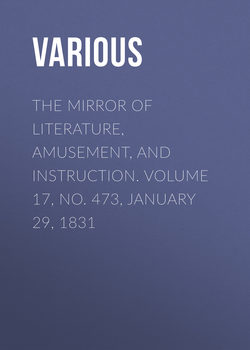Читать книгу The Mirror of Literature, Amusement, and Instruction. Volume 17, No. 473, January 29, 1831 - Various - Страница 4
THE STRAND, ANCIENT AND MODERN
ORIGIN OF THE ENGLISH TITLE "DUKE OF CLARENCE."
Оглавление(To the Editor.)
In No. 437 of the Mirror, is an account of "Clarence and its Royal Dukes, " which seems to imply that the title is derived from a town in Suffolk; but according to a recent traveller, the origin is of much older date, having descended by marriage, from the Latin conquerors of Greece. He thus describes the ancient town of Clarentza:—"One of the most prominent objects was Castel Tornese, an old Venetian fort, now a ruin, but in former days affording protection to the town of Chiarenza, or Clarentza, which, by a strange decree of fortune, has given the title of Clarence to our Royal Family. It would appear that at the time when the Latin conquerors of Constantinople divided the Western Empire amongst their leading chieftains, Clarentza, with the district around it, and which comprised almost all of ancient Elis, was formed into a Duchy, and fell to the lot of one of the victorious nobles, who transmitted the title and dukedom to his descendants, until the male line failed, and the heiress of Clarence married into the Hainault family. By this union, Phillippa, the consort of Edward III. became the representative of the Dukes of Clarence; and on this account was Prince Lionel invested with the title, which has since remained in our Royal Family. It is certainly singular that a wretched village in Greece should have bestowed its name upon the British monarch." According to the above account, Clarentia, I should suppose, is a corruption of Clarentza, and, perhaps, took its name in honour of the son of the warlike Edward; but, as to a "wretched village in Greece," bestowing its name upon the British monarch, the writer must be aware, according to his own account, that in ancient times Clarentza was no more a poor village, than Clare is what it was, when the wassail bowl cheered the baronial hall of its now mouldering castle.
W.G.C.
